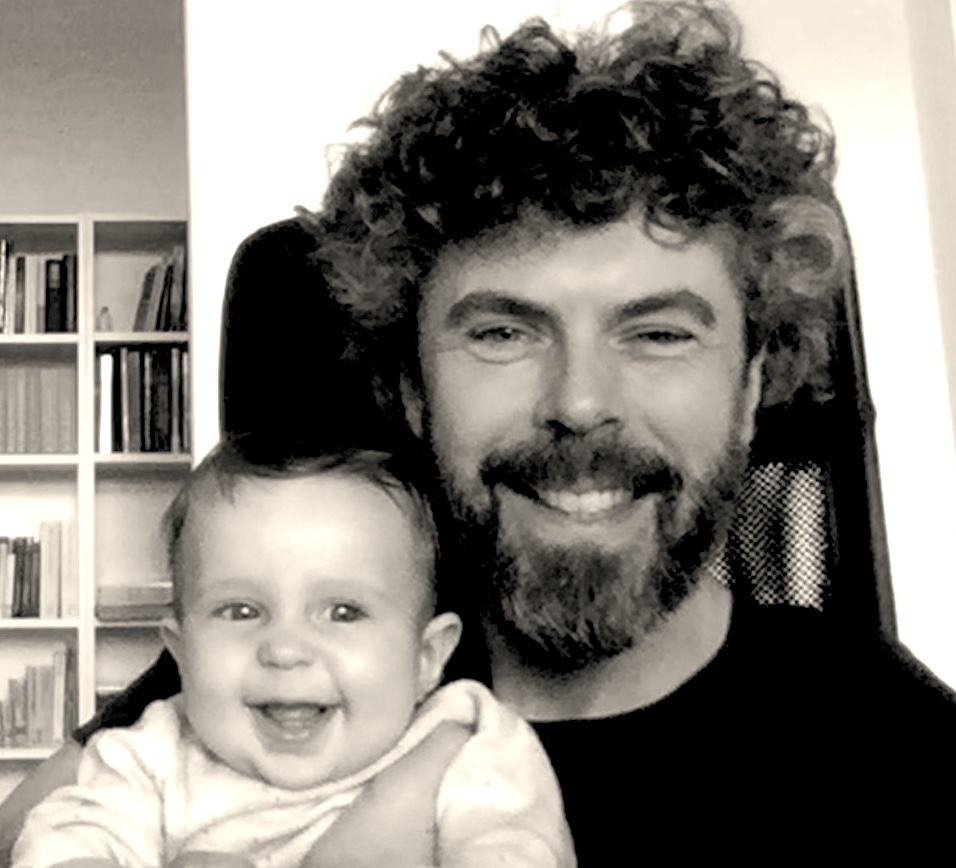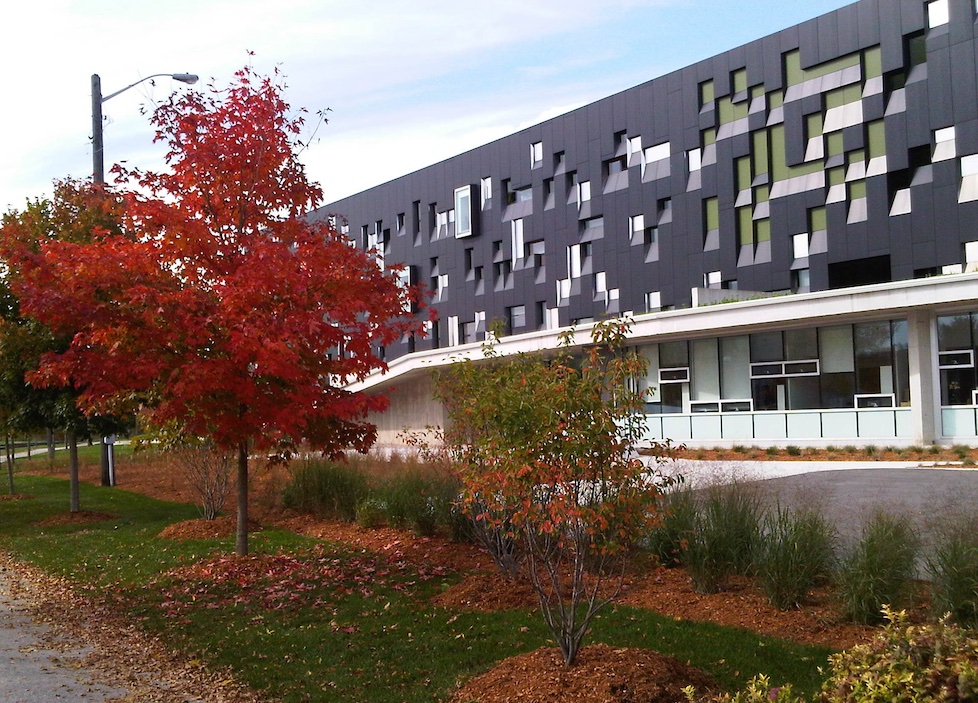Curriculum Vitae
| Name: | Dr. Markus Paul Müller |
| Marital status: | Happily married, proud father of Joseph (*2019) and Eleni (*2022). |

Professional Experience
| since 07/2017 | Research Group Leader (tenured since 07/2022), Austrian Academy of Sciences, Institute for Quantum Optics and Quantum Information (IQOQI) Vienna. Visiting Fellow, Perimeter Institute for Theoretical Physics, Waterloo, Canada. Associate Faculty member, Rotman Institute of Philosophy, University of Western Ontario, Canada. |
| 07/2015 – 06/2017 | Assistant Professor (tenure track) and Canada Research Chair in the Foundations of Physics, Departments of Applied Mathematics and Philosophy, University of Western Ontario, London, Canada. Associate Faculty member, Perimeter Institute for Theoretical Physics. |
| 09/2013 – 05/2015 | Junior Research Group Leader, Institute for Theoretical Physics, Heidelberg University, Germany. |
| 11/2010 – 08/2013 | Postdoctoral fellow, Perimeter Institute for Theoretical Physics, Waterloo, Canada. |
| 10/2007 – 09/2008 | Postdoctoral researcher at the Max Planck Institute for Mathematics in the Sciences, Leipzig (on leave from my position at TU Berlin). |
| 11/2004 – 10/2010 | Research Assistant (“Wissenschaftlicher Mitarbeiter”), Institute of Mathematics, Technical University of Berlin, Germany. |
Education
| 11/2021 | Habilitation, University of Vienna, venia docendi in Theoretical Physics. Title of thesis: Reconstructions of Quantum Theory. |
| 09/2007 | Dr. rer. nat., Technical University of Berlin, with distinction (summa cum laude). Title of thesis: Quantum Kolmogorov Complexity and the Quantum Turing Machine. Supervisor: Prof. Dr. Ruedi Seiler. |
| 09/2004 | Diploma in Physics, Technical University of Berlin, very good. |
| 10/1998 – 09/2004 | Studies of Physics and Mathematics in Erlangen, Stony Brook (NY), and Berlin. |
| 08/1997 – 09/1998 | Replacement for military service: care for mentally and visually disabled children, Blindeninstitutsstiftung Rückersdorf. |
| 07/1997 | Abitur, Paul-Pfinzing-Gymnasium Hersbruck, Bavaria, Germany, 1.0 (best possible grade). |
Awards
| 07/2020 | First Prize at the FQXi Essay Contest on “Undecidability, Uncomputability, and Unpredictability”, for this essay. Among >200 participants, two first prizes of $10,000 each were awarded (the other one went to Prof. Klaas Landsman). |
| 12/2019 | Best Paper Award 2019 by the Austrian Academy of Sciences, for this publication. Awarded annually for the best paper by any researcher under 45 who works with the Academy in any area of the sciences, mathematics, medicine, or engineering. |
| 07/2016 | Birkhoff-von Neumann Prize for “outstanding scientific achievements in the field of quantum structures”, see here. |
| 2002-2007 | Scholarship by the Studienstiftung (German National Academic Foundation). |
| 05/1998 | First prize at the German youth science contest “Jugend forscht” in mathematics and computer science. Exceptional prize by the Federal President (unique among >6400 participants of all research fields). |
| 05/1995 | Second prize at Jugend forscht in mathematics and computer science. Exceptional Prize by the Federal Chancellor, Talent Identification Program at Duke University, USA. |
Third-party funding
| 03/2024 – 08/2026 | QuantA core project (FWF funded) on Local operations on quantum fields. The Austrian Science Fund FWF funds a PhD position. |
| 04/2024 – 03/2026 | Principal Investigator project on Generalized contextuality in large quantum systems. €380K from the Austrian Science Fund FWF. |
| 05/2021 – 04/2025 | Stand-Alone project on Black-box quantum information under spacetime symmetries. €600K from the Austrian Science Fund FWF. |
| 09/2020 – 08/2022 | FQXi Grant (Foundational Questions Institute) and from the Fetzer Franklin Fund on Mathematical models of idealism and dualism: an adversarial collaboration, jointly with Prof. Kelvin McQueen (Chapman University, CA). USD $32K. |
| 11/2018 – 08/2020 | FQXi Large Grant on Where agents and algorithms meet – free will and computational irreducibility. USD $66K from the Foundational Questions Institute. |
| 12/2016 – 08/2019 | Grant by the John Templeton Foundation on Quantum Causality. USD $2.5M for an international consortium of 10 research groups. |
| 11/2016 – 03/2019 | FQXi Large Grant on Emergent objective reality – from observer states to physics via Solomonoff induction. USD $102K from the Foundational Questions Institute. |
| 04/2016 – 06/2017 | Discovery Grant on Quantum correlations in the context of spacetime physics. CAD $160K for five years (discontinued due to move to Vienna). From the government of Canada via NSERC (Natural Sciences and Engineering Research Council). |
| 07/2015 – 06/2017 | Canada Research Chair (tier 2) in the Foundations of Physics. CAD $500K for five years (discontinued due to move to Vienna). From the Government of Canada via NSERC (Natural Sciences and Engineering Research Council). |
| 10/2007 – 09/2008 | Advanced research and training grant by the Max Planck Society. €14K to do research at the MPI for Mathematics in the Sciences (Leipzig) for one year. |
| 01/2007 | Scholarship by DFG and DMV for a one-month research visit to the US (IQI Caltech, and AMS Meeting, New Orleans). |
| 2004 | Science journalism scholarship from the Dr. Alexander and Rita Besser-Stiftung (turned down in favor of Research Assistant position). |
Further Scientific Activities
| Currently…………….. | VCQ Board Member (Vienna Center for Quantum Science and Technology, representative of ÖAW); Member of Steering Committee, International Centre for Theory of Quantum Technologies, Gdańsk; Member of Erwin Schrödinger Center for Quantum Science & Technology (ESQ), Vienna Doctoral School in Physics (VDSP), Quantum Aspects of Spacetime Research Network (TURIS), Vienna. |
| Since 2023 | Public outreach: Talks about quantum physics and Bell’s Theorem in schools via ÖAW’s “Akademie im Klassenzimmer” (so far: Borg3-Gymnasium, Billroth-Gymnasium, Wien). Lange Nacht der Forschung, Vienna. |
| Since 2023 | Member of selection committe for the Austrian “Studienstiftung”, supporting talented young students. |
| 12/2019 – 11/2023 | Associate Editor, Foundations of Physics (Springer). |
| Since 2015 | External Dissertation Committee Member: Gaurav Saxena (University of Calgary) 2022, Fabian Clivaz (University of Geneva) 2020, Cristina Cirstoiu (Imperial College London) 2019, Carlo Maria Scandolo (University of Oxford) 2018, Daniel Ebler (Hong Kong University) 2018, Joshua M. Luczak, Jared Richards, and Saad Anis (University of Western Ontario, Canada) 2015-2016. |
| Since 2014 | Program Committee Member of various conferences: QIP (Quantum Information Processing) 2025, TQC (Theory of Quantum Computation, Communication and Cryptography) 2023, Foundations 2023, and earlier ones. |
| Since 2014 | (Co)-Organization of several conferences: Vienna Quantum Foundations Conference 1+2 (2021 and 2024), Mind and agency in the Foundations of Quantum Physics (Chapman University, 2022); Algorithmic information, induction, and observers in physics (Perimeter Institute, 2018); Information Theoretic Interpretations of Quantum Mechanics (Rotman Institute of Philosophy, 2016); Information Theoretic Foundations for Physics (Perimeter Institute, 2015). |
| Since 2007 | Reviewing for various journals (Physical Review Letters, Nature Physics, Nature Communications, Quantum, Communications in Mathematical Physics, New Journal of Physics, Annals of Physics, IEEE Transactions on Communications, …) and grant agencies (Swiss National Foundation, Canada Research Chairs Program, Polish National Science Center, Helmholtz Association, …). |
Biography
I grew up in a tiny village called “Morsbrunn” in beautiful Franconia – 90 people, dung heaps, chickens running across the road. My beloved grandfather Paul (hence my middle name) spent his entire life there as a farmer, but during our long walks he would look up at the sky and wonder: what if we were always flying straight ahead in a spaceship, would we always fly on or come back at the starting point? Where does all this intricate structure and beauty in the world come from? Why is there something rather than nothing?
I must have inherited this passionate curiosity, and so I became a nerdy teenager with a love for math, physics and programming. These were not particularly popular hobbies (to put it mildly), but I was lucky enough to discover the German youth science competition “Jugend forscht”. Participating allowed me to meet wonderful people my age who shared the same passion. Winning a national second prize at age 17, I was sent to the USA for a one-month stay, helping excavate Anasazi remains in New Mexico. At age 20, I won a first prize and met the brilliant mathematician Dierk Schleicher, who helped me write up my results in a professional way.

At the same time, a very different experience changed my view of life: I spent a year taking care of children and young people with multiple disabilities as a substitute for military service. The wonderful experiences during that year have had a profound impact on me. They reinforced my lifelong passion for foundational questions about the nature of reality, and my conviction that the first person (the mind, or the self) plays an irreducible role in it.

I started studying physics in nearby Erlangen, but then I spent 9 years in Berlin, where Karl-Eberhard Hellwig, Ruedi Seiler and later on Jens Eisert taught quantum information theory, and a city with a thriving subculture of students and artists. It was only towards the end of my doctoral studies when I discovered the field of Quantum Foundations, which has become my intellectual home. I took up a postdoc position at Canada’s Perimeter Institute for Theoretical Physics, where I had the privilege to meet many brilliant minds and lifelong friends.
After Junior Group Leader and Assistant Professor positions in Heidelberg and London Ontario, I finally moved to IQOQI Vienna in 2017. I am extremely grateful for working among such brilliant colleagues, and at one of the best places in the world for research on the foundations of physics.
When I visit Morsbrunn today, my grandfather is sorely missed. But walking the same paths now with my own kids, I can’t help but be optimistic that they will find their answers to questions that I didn’t even dare to ask.
